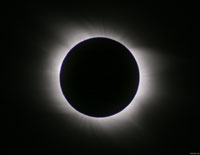Longest 21st Century Solar Eclipse Darkens Asia
A total solar eclipse was viewed in Asia by hundreds of millions of people, though in some places thick summer clouds blocked the sun.

The longest total solar eclipse of the 21st century cut through the world's most populous nations, India and China, as it travelled half the globe. It was visible along a roughly 250 km-wide (155 miles) corridor, U.S. space agency NASA said, Reuters reports.
Day turned into night. Temperatures turned cooler in cities and villages teeming with amateur stargazers.
The total eclipse could be seen starting in India on Wednesday morning and moving eastward across Nepal, Bangladesh, Bhutan, Vietnam, China and parts of the Pacific.
Tim O'Rourke, a 45-year-old freelance photographer from Detroit, Michigan, lives in Hong Kong but traveled up to Shanghai - touted as one of the best spots to watch the eclipse.
"It was pitch black like midnight," said O'Rourke, standing in People's Square with what appeared to be a crowd of thousands.
"Definitely not disappointed we came. Of course it would have been much better with nice weather, blue skies. But still it was a great experience, it was a lot of fun." he said, CNN International reports.
Only the solar corona was visible during the eclipse: a much fainter white ring 600,000 miles from the Sun's surface.
Between two and five solar eclipses occur each year across the world, with each existing only along a narrow corridor in the relatively small area of the Moon's shadow.
Although they occur somewhere on Earth around every 18 months, it has been estimated that total eclipses recur at any given place only once every 370 years on average.
During this morning's eclipse, the Moon's shadow moved from west to east across the Earth at over 1500mph.
Its exceptional duration of six minutes and 39 seconds at its maximum point was a result of the Moon being near perigee – its closest position to the earth.
It is impossible for an eclipse to last more than seven minutes and 40 seconds at its maximum point, and is usually much shorter: during each millennium there are typically fewer than 10 total solar eclipses exceeding seven minutes. The last was in 1973.
The longest total solar eclipse during the 8,000-year period from 3000BC to 5000AD will occur on July 16, 2186, when "totality" will last seven minutes and 29 seconds, Telegraph.co.uk reports.
Subscribe to Pravda.Ru Telegram channel, Facebook, RSS!

